Up until a generation ago if one was fortunate enough to find work locally as likely as not one worked in the mill.
Damolly Mill closed down twenty five years ago, in 1979. For almost two and a half centuries it – under different guises – had provided employment and community life for ten generations of local people.
Wilson’s Mill’s time-piece !
The Damolly Mill first went into commercial production – it made spades, using the flow of the adjacent Clanrye Rive as power – in the eighteenth century. In later incarnations it was variously a corn mill, flax-scutching, spinning mill, weaving, and finally a carpet making concern. The first mill workers houses -without foundations, the residents beating the underlying clay hard before laying foundation flagstones – were erected more than a century and a half ago under Alexander MacNeill. In the second half of the twentieth century, the number of such houses was doubled under the successful Bedford Street Weaving Company. The walls were 50cm thick and of granite and the roofs had Bangor Blue slates. There were no bathrooms or waste disposal systems, all having to be transported away by horse and cart. Despite such privation many is the family of eight or more persons that was reared here.
The above weaving company thrived until the great recession. The linen yarn came via the canal in horse-drawn barges from Portadown: the coal that powered the steam looms in the main buildings came from Newry port also along the canal. There were 40-50 power looms, each attended by a separate weaver. The power looms were called ‘Plucksticks’ because of the sticks that knocked the shuttle back and forwards across the loom, trailing a long length of string. Unfortunately the shuttle caused many arm and leg injuries. The ‘beamer’ was the most skilled workman because he tied the weaving threads to the beam. Before weaving and finishing were undertaken on this site, the spun linen was wound unto big wooden rollers for transport to Belfast and elsewhere for bleaching, dying and finishing. The older men worked the slower paced water wheels.
The men worked from 6 a.m. to 6 p.m. five days a week for about 9-10 shillings. Their wages were placed in snuff-boxes or tins with their names on them. The women who worked in the mill were allowed to return home from 10.00-10.30 a.m. to make the breakfast and to feed the babies. At 1 p.m. everyone broke for dinner, the locals returning home, the Newry ones eating their packed lunches. The overseer, Mr McGladdery was very strict and anyone lazing or returning late was dismissed.
The factory lay idle until, at the start of the Second World War a Mr Vincent Smyth from India reopened the premises under the name Damolly Spinning Company. In 1954 it was taken over by the Trafford Carpet Company to produce Axminster and Wilton carpets. The houses were sold to the workers who now, instead of 2/6 a week rent, paid
